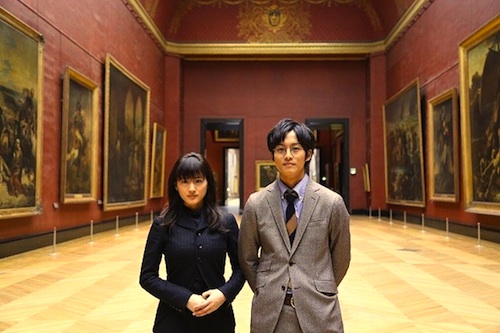By Joe Bendel. Really good film festivals are not just an assortment of screenings. They provide a sense of community. Every year, I look forward to fests like Sundance, NYAFF, and the Bosnian-Herzegovinian Festival because of the people I expect to see there. That is why the continuation of the Odessa International Film Festival represents a small but significant victory for Ukraine’s cultural sector. Unfortunately, there is one particular filmmaker who will not be able to attend.
Pro-Ukrainian democracy activist Oleg Sentsov was arrested by the Russian military while attempting to smuggle food to barricaded Ukrainian military personnel in the occupied province of Crimea. He is now being held on trumped up terrorism charges, awaiting a show trial in Moscow. To date, Ukrainian consular personnel have been denied access to Sentsov, in clear violation of diplomatic law and custom. In his place, Sentsov will be represented at this year’s inspiringly defiant OIFF with his 2011 feature directorial debut, Gaamer, which has a special screening this Tuesday.
Ostensibly, there are no political implications to be gleamed from Gaamer. The extra “a” represents a distinctively Slavic pronunciation of “gamer” adopted by video game fanatics in parts of Eastern Europe. Sentsov was once part of the subculture, just like his protagonist. Alex is an unrepentant underachiever. However, under his gamer handle Koss, he is one of the top players of the first-person shooter Quake in his depressed post-industrial town.
Much to his long suffering mother’s frustrations, Alex/Koss has been expelled from his technical school, preferring to idle his time away in a computer gaming parlor, presumably much like the one Sentsov once managed. When he places highly in a local tournament, he is recruited by one of the top national teams. At least he will have free gaming for the near future, but then what?
It is tempting to try to read further political significance into the work of filmmakers like Sentsov or Iranian dissident Jafar Panahi, because you would think it has to be in there somewhere to justify such heavy-handed human rights abuses. However, there is absolutely no commentary on neo-Soviet Imperialism to be found in Gaamer.
Instead, it is a film about lifestyle choices and their consequences. Specifically, it examines the awkward period when gaming loses its thrill. After all, a video game is by its nature fleeting and apparently Quake is one of those games that always ultimately ends with a player’s in-game death. So just what does Alex/Koss have to show for his monitor time?
Frankly, Putin would probably prefer an anesthetized Ukraine, lulled by video games or whatever into a state of extreme myopia. In that limited sense, Gaamer’s get-out-and-get-involved-in-life message is somewhat at odds with his expansionist agenda. However, the truth of the matter is Sentsov was simply rounded up for being a prominent ethnic Ukrainian in the Crimea, with a history of democratic activism.
Clearly, Sentsov also understands the characters of Gaamer and the worlds in which they interact. Vladislav Zhuk is totally convincing as the socially underdeveloped Alex/Koss, but his distant, cipher-like nature is sometimes frustrating. While it is not exactly a showy role, Zhanna Biryuk perfectly calibrates her performance as his mother.

All things considered, Gaamer is a very promising first feature. It has its odd rough edges and pacing issues here and there, but those who see it would be intrigued enough look out for Sentsov’s follow-up film. Unfortunately, production on what was to be called Rhino was postponed due to the Maidan Square protests and the Russian invasion. Any serious filmmaker like Sentsov deserves to have a chance to develop his art over the course of several pictures, but his abduction and incarceration now makes that impossible. Even Putin-approved filmmaker Nikita Mikhalkov has (somewhat boldly) joined the chorus of voices demanding his release.
If you happened to be in Odessa attending the screening of Gaamer on Tuesday (7/15), that was a great way to show solidarity, while seeing a good movie in the process. For the rest of us, light up the social networks and online petitions. Free Oleg Sentsov.
LFM GRADE: B+
Posted on July 16th, 2014 at 10:39am.

